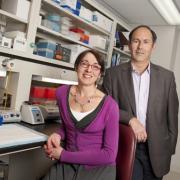Mobile Menu
- Education
- Research
-
Students
- High School Outreach
- Undergraduate & Beyond: Community of Support
- Current Students
- Faculty & Staff
- Alumni
- News & Events
- Giving
- About
Paul Fraumeni and Nicole Bodnar

Most people try hard not to think about the trillions of microorganisms – bacteria, viruses and fungi – that live on and inside our bodies, but like it or not, these microbes have a tremendous impact on many aspects of health and disease.
They’re also at the heart of Dana Philpott's research and a new $6-million Canada Foundation for Innovation (CFI)-funded research project – U of T’s Host-Microbiome Research Network.
Philpott’s project is one of nine research projects at U of T that have been awarded a total of $21 million from the CFI.
Philpott, an associate professor in the Faculty of Medicine’s Department of Immunology, says these microbes may cause inflammation inside the body, which many scientists believe is the root cause of many chronic diseases, including diabetes and obesity.
“Right now, we have no idea what a normal microbial profile looks like, but we do know that some bacteria can cause inflammation,” says Philpott, who, along with Ken Croitoru, professor in the Department of Medicine and Division of Gastroenterology at Mount Sinai Hospital, will lead U of T’s Host-Microbiome Research Network, located in U of T and Mount Sinai Hospital laboratories.
“If we can get rid of the inflammation-causing bacteria using targeted antibiotics or probiotic cocktails, we might be able to treat or even prevent disease. This could represent a new aspect of personalized medicine. We can’t see them, but in the future these microbes will play a pivotal role in how diseases like cancer and heart disease are detected, treated and one day, prevented.”
As part of the new initiative, Mount Sinai Hospital will open Canada’s largest clinical research unit dedicated to investigating inflammatory bowel disease (IBD) and helping to find better treatments to improve the lives of some 200,000 Canadians.
The clinical research unit will allow Croitoru and his colleagues to integrate IBD research and clinical care under one roof, so that when patients visit the hospital for care, research studies will allow for patients to undergo state-of-the-art MRI imaging of the intestine to be correlated with the degree of inflammation, the nature of the gut microbiome and changes in the immune response. The goal is to create a personalized profile of a patient’s risk of developing the disease and to determine their specific triggers based on their immune responses and the profile of the microbes in their bodies.
The awards are part of a total of $166 million awarded by the CFI to institutions across Canada. The CFI is an independent corporation created by the Government of Canada to fund research infrastructure. This round of investment is from the CFI’s Leading Edge Fund and New Initiatives Fund. CFI announced the funding on January 15.
For more information, please contact:
Leslie O’Leary
Senior Specialist, Media Relations and Public Affairs
Mount Sinai Hospital
416-586-4800 ext. 8306
lo’leary2@mtsinai.on.ca
Nicole Bodnar
Media Relations & Communications Specialist
Faculty of Medicine, University of Toronto
416-978-5811
Nicole.bodnar@utoronto.ca